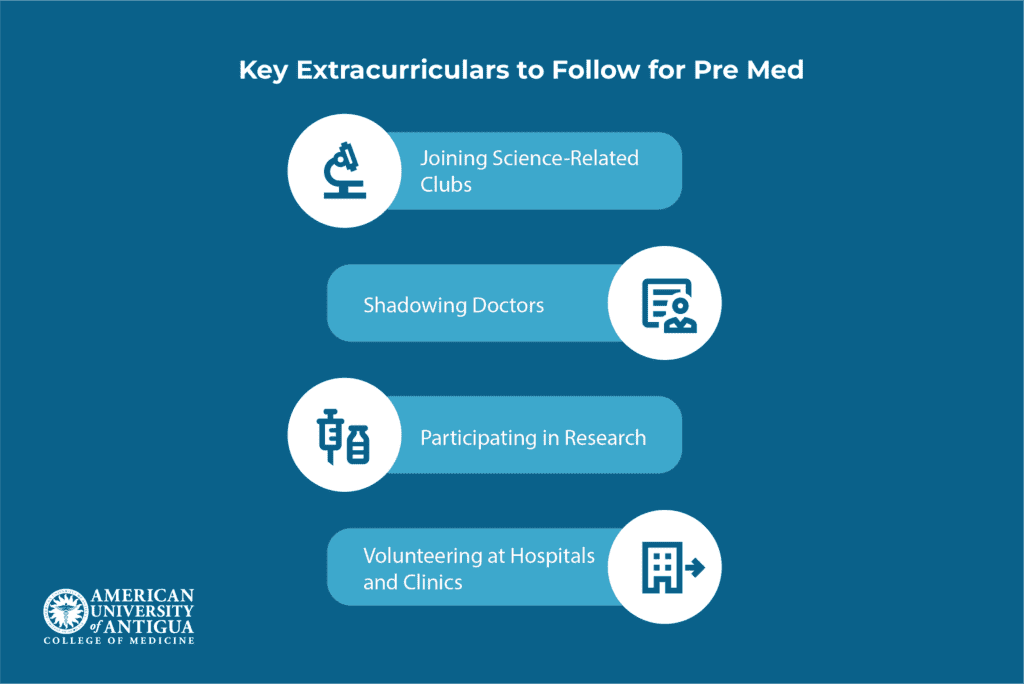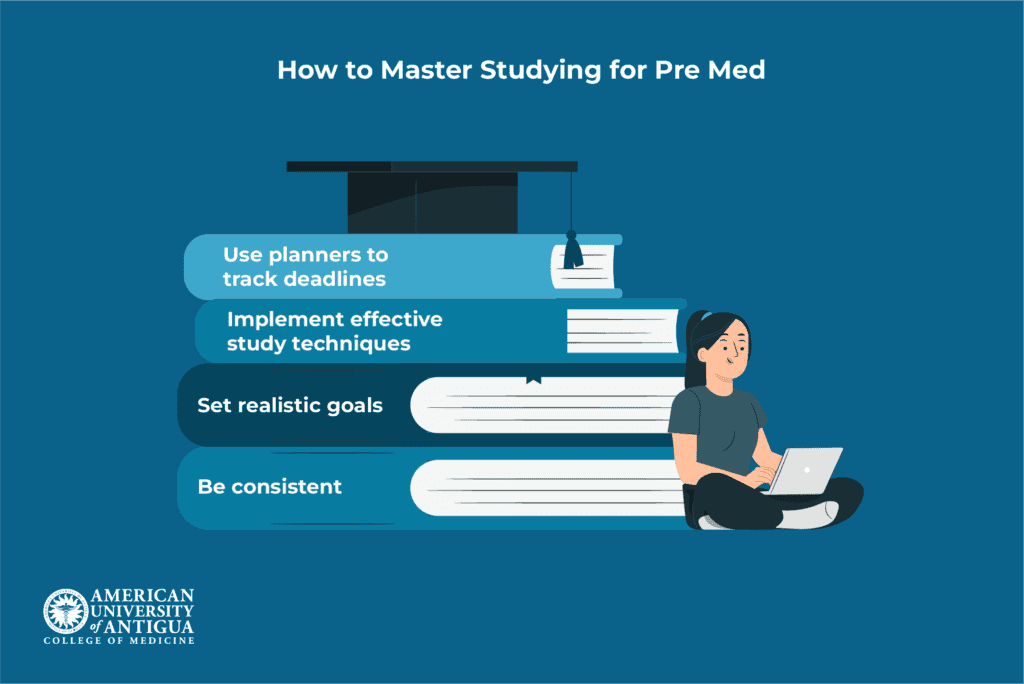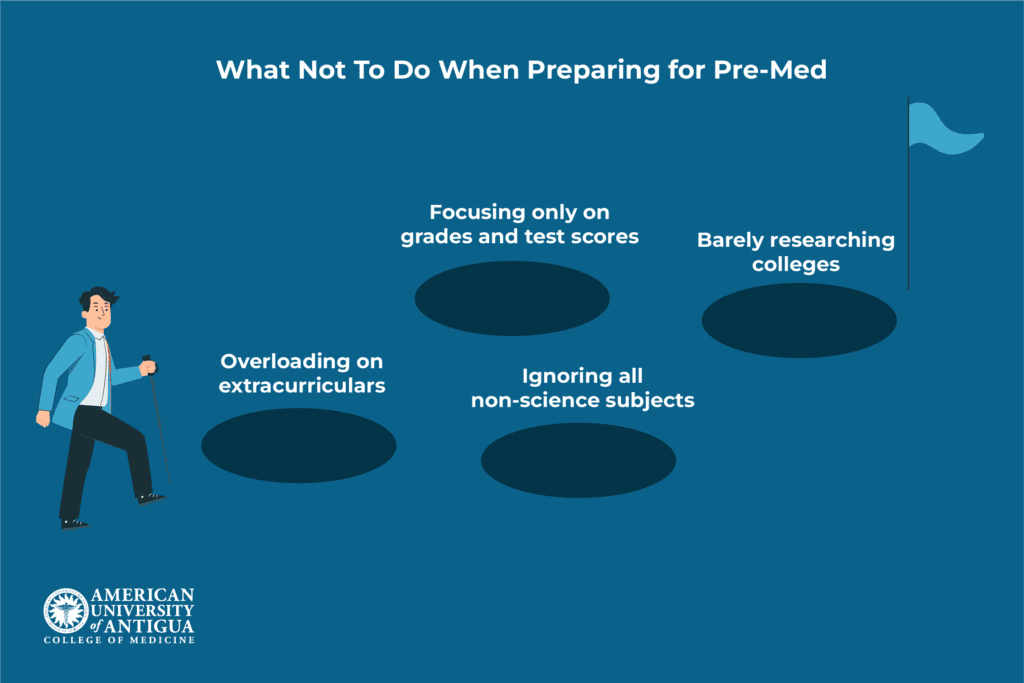How to Prepare for Pre Med in High School: Essential Steps
Key Takeaways
- Excelling in academics and extracurriculars during high school sets you up for success in pre-med.
- Gaining hands-on experience, building relationships with mentors, and exploring different medical career paths strengthen your medical school application.
- Common mistakes to avoid when preparing for pre-med include neglecting non-science subjects, focusing only on grades and test scores, and failing to thoroughly research colleges.
Pre-med is the college track that prepares you for medical school, focusing on science, healthcare, and hands-on experience. With medical school admissions being highly competitive, early preparation in high school can give you a major advantage.
Knowing how to prepare for pre-med in high school will help you build a strong foundation in science, gain relevant extracurricular experience, and develop skills that medical schools highly value. If you want to maximize your chances of getting into your dream medical school, keep reading!
✅ Request information on AUA's MD program TODAY!
YOUR PATH TO SUCCESS BEGINS HERE
How to Prepare for Pre-Med in High School
Preparing for a medical career starts long before college. High school students can gain an edge by excelling in academics, participating in science and healthcare-related activities, and developing essential skills like leadership and time management. A well-rounded approach, not just perfect grades, sets the foundation for success in pre-med and beyond.
Take the right high school courses
High school students aiming for medical school should prioritize science and math courses like Biology, Chemistry, and Physics, especially AP or IB options. These build a strong foundation for college pre-med coursework.
Math, particularly Algebra and Statistics, is essential for understanding medical data. English is just as important – doctors need strong communication skills for patient care and medical writing. Psychology, on the other hand, helps future physicians understand human behavior and mental health, both critical in medicine.
Dual enrollment or college-level courses provide a head start, demonstrating academic rigor and reducing future course loads. Such a well-balanced curriculum prepares students for the challenges of a medical career.
Get involved in science and health-related extracurriculars

Engaging in science and health-related extracurriculars is a great way for high school students to explore their interest in medicine while strengthening their future applications.
- Joining clubs like HOSA, Biology Club, or Science Olympiad helps develop teamwork and problem-solving skills.
- Shadowing doctors provides firsthand exposure to the medical field, offering insights into daily responsibilities and patient interactions.
- Participating in research teaches students how to think critically and analyze scientific data.
- Volunteering at hospitals or clinics demonstrates commitment to patient care and cultivates empathy.
These experiences not only build a strong foundation but also help students determine if medicine is the right path for them.
Gain clinical and hands-on experience
Gaining clinical and hands-on experience in high school allows students to explore the medical field early and confirm their passion for healthcare. Volunteering at hospitals, clinics, or nursing homes provides exposure to patient care, teamwork, and the healthcare environment.
For more direct involvement, students can become CPR certified or even train as an EMT, gaining valuable emergency response skills. These hands-on opportunities strengthen medical school applications while helping students develop confidence, empathy, and problem-solving abilities in real-world settings.
Build leadership and community involvement
Leadership and community involvement are essential for future medical professionals. Holding leadership roles in clubs or student government shows initiative, responsibility, and teamwork — qualities medical schools highly value. Leading a club or mentoring younger students also showcases the ability to guide and inspire others.
Beyond school organizations, students can make a meaningful impact by organizing health awareness events, such as mental health workshops, blood drives, or fundraisers for medical charities. These initiatives reflect dedication to public health and advocacy.
Long-term involvement in service projects, like volunteering at a hospital or running a community health blog, demonstrates a commitment and passion for helping others. Medical schools look for applicants who excel beyond academics and actively engage in their communities, making leadership and service experience invaluable.
Excel in standardized tests (SAT, ACT, and AP exams)
Strong standardized test scores enhance college applications, particularly for competitive pre-med programs, by showcasing academic strength and readiness for rigorous coursework. High scores can also earn college credit, reducing future course loads.
To excel in the SAT, ACT, or AP exams, students should start preparing early, take practice tests, and use reliable study resources. Time management and test-taking strategies, like eliminating wrong answers and pacing sections wisely, make a significant difference.
For pre-med preparation, AP Biology and AP Chemistry are essential, as they lay the foundation for college coursework. AP Physics and AP Calculus strengthen problem-solving skills, while AP Psychology provides valuable insights into human behavior.
Develop strong study and time management skills

Handling a rigorous course load requires strong study and time management skills. Stay organized by using planners or digital calendars to track assignments and deadlines.
Effective study techniques – like active recall, spaced repetition, and summarizing complex concepts – are especially useful for science-heavy subjects. Breaking large topics into smaller sections and using visual aids can also improve retention.
Balancing academics with extracurriculars requires setting priorities and avoiding procrastination. Creating a structured study schedule, setting realistic goals, and learning to say no to unnecessary commitments help maintain focus. Developing good habits in high school prepares students for the demands of pre-med and medical school.
Research and choose the right pre-med colleges
Selecting the right pre-med college involves considering factors like academic reputation, faculty expertise, research opportunities, and the availability of pre-med advising. A strong support system and connections with hospitals and healthcare facilities are valuable for gaining clinical experience.
Students can opt for a traditional pre-med track or a BS/MD program. Traditional tracks allow flexibility in choosing a major, while BS/MD programs offer a direct path to medical school, usually with guaranteed acceptance if students meet specific requirements.
It’s also important to research medical school acceptance rates, as higher rates often indicate strong pre-med support and successful outcomes. Choosing a college with a good track record of placing students in medical schools can significantly improve the chances of admission.
Plan for medical school costs and scholarships
Medical school is a major financial commitment, making early financial planning essential. Start by researching tuition costs and living expenses for potential schools, as these can vary widely. Scholarships, including merit-based awards and need-based grants, can help reduce costs. Some scholarships are school-specific, while others are state or nationally funded.
To minimize undergraduate debt, consider:
- Choosing an affordable college
- Taking dual-enrollment courses to earn credits early
- Seeking internships or part-time jobs
- Reducing unnecessary expenses.
Build strong relationships with teachers and mentors
Strong relationships with teachers and mentors are a major asset in the pre-med journey. Personalized recommendation letters, especially from science and math teachers, can strengthen your college and medical school application by highlighting academic excellence, work ethic, and character.
Finding mentors in the medical field, such as doctors, researchers, or professors, is another game-changer. These mentors can offer priceless advice, introduce you to research opportunities or shadowing experiences, and write recommendation letters.
Additionally, start networking early by attending career fairs, joining health-focused clubs, or volunteering. The professionals you connect with can provide valuable insights and open doors to future opportunities.
Stay committed to exploring your passion for medicine
A strong passion for medicine should remain at the core of a pre-med journey. Continuous learning, whether through books, documentaries, or podcasts, keeps you informed and inspired while deepening your understanding of the field.
Additionally, following medical influencers like Dr. Atul Gawande or Dr. Sanjay Gupta can provide invaluable insights into healthcare and medicine.
Lastly, it’s important to keep an open mind about different medical career paths. Whether it’s surgery, research, or public health, gaining exposure to various specialties can help you discover where your true passion lies and make an informed career decision.
Common Mistakes to Avoid When Preparing for Pre-Med
Preparing for pre-med can be overwhelming, and many students make mistakes that hinder their chances of success. Being aware of these common pitfalls can help you stay on track and establish a solid foundation for medical school. Below, we have provided some mistakes you should avoid when preparing for pre-med.

Overloading on extracurriculars at the expense of academics
While extracurriculars are important, students often take on too many, neglecting their coursework. Instead of spreading yourself too thin, focus on quality over quantity. Choose activities that match your interests and career goals while ensuring they don’t interfere with your academic performance.
Ignoring non-science subjects that help with communication and critical thinking
Pre-med students sometimes overlook courses like English, psychology, or philosophy, assuming only science matters. However, these courses develop strong communication and critical thinking skills, which help you excel in your medical career.
Focusing only on grades and test scores without hands-on experience
While good grades and test scores are essential, hands-on experience in healthcare – like volunteering or shadowing – proves your commitment to medicine and gives you a deeper understanding of patient care.
Not researching colleges thoroughly before applying
Many students apply to colleges based solely on rankings, overlooking factors like location, financial aid, pre-med resources, and research opportunities. Research schools thoroughly to find one that matches your academic and personal goals.
Resources for High School Pre-Med Students
High school pre-med students have access to a wealth of resources that will help them prepare for their future medical careers, including:
Online courses and pre-med summer programs
Websites like Coursera and Khan Academy offer free online courses in biology, chemistry, and other subjects relevant to pre-med, which can strengthen foundational knowledge. Summer programs, like those offered by the National Institutes of Health (NIH) or local universities, provide hands-on experience and valuable insight into medical research, while enhancing your medical school application.
Books and podcasts
Books like The Premed Playbook by Ryan Gray and Becoming a Doctor by Perri Klass offer valuable insights and personal experiences, helping you understand what to expect in a medical career. Podcasts such as The Premed Years and Med School Insiders also provide advice and inspiration from professionals in the field.
Organizations and websites
Websites like the Association of American Medical Colleges (AAMC) provide essential information on pre-med tracks, medical school admissions, and scholarship opportunities. Joining organizations like HOSA or shadowing local healthcare professionals gives students hands-on experience, offers a glimpse into the daily responsibilities of healthcare workers, helps build networking connections, and enhances a pre-med application.
Conclusion
To kickstart your pre-med journey, focus on excelling in science and math, get involved in extracurriculars, and gain practical experience through volunteering or shadowing doctors. Build relationships with mentors and stay committed to learning about medicine through books, podcasts, or real-world experiences.
Remember, it’s not all about grades; developing communication, critical thinking, problem-solving, and leadership skills matters too. Stay focused, work hard, and keep exploring all that medicine has to offer.
If you’re considering medical school options, look into AUAMED, where you can find a welcoming, supportive environment to begin your medical career.
Frequently Asked Questions
What high school courses should you take to prepare for pre-med?
Take science courses like Biology, Chemistry, and Physics, along with advanced math and English, to build a strong foundation. AP or IB courses can give you a head start.
Is a 3.4 GPA good for pre-med?
While a 3.4 GPA is decent, top-tier pre-med programs often look for higher GPAs, typically above 3.7. You may need to work on improving grades or supplement your application with strong extracurriculars.
How can you tell if you’re good enough for pre-med and medical school?
If you’re passionate about healthcare, excel in science, demonstrate strong problem-solving skills, and show a commitment to hands-on experience, you’re on the right path to pre-med and medical school.
✅ Request information on AUA's MD program TODAY!
YOUR PATH TO SUCCESS BEGINS HERE
✅ Request information on AUA's MD program TODAY!